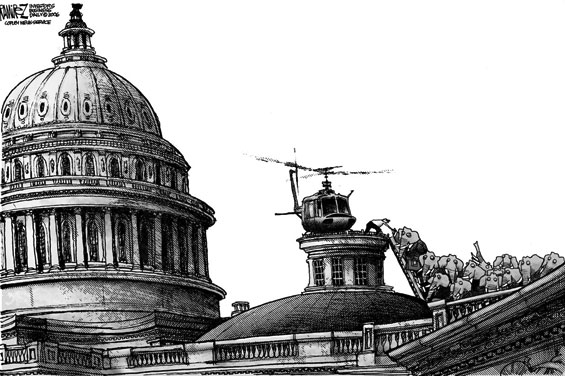 Olbermann: Special comment about 'sacrifice'
Olbermann: Special comment about 'sacrifice'
BBC reports Bush will reveal troop surge plan in sacrifice-themed speech
SPECIAL COMMENT
By Keith Olbermann
Anchor, MSNBC's 'Countdown'
Jan 3, 2007
If in your presence an individual tried to sacrifice an American serviceman or woman, would you intervene?
Would you at least protest?
What if he had already sacrificed 3,003 of them?
What if he had already sacrificed 3,003 of them — and was then to announce his intention to sacrifice hundreds, maybe thousands, more?
This is where we stand tonight with the BBC report of President Bush’s “new Iraq strategy,” and his impending speech to the nation, which, according to a quoted senior American official, will be about troop increases and “sacrifice.”
The president has delayed, dawdled and deferred for the month since the release of the Iraq Study Group.
He has seemingly heard out everybody, and listened to none of them.
If the BBC is right — and we can only pray it is not — he has settled on the only solution all the true experts agree cannot possibly work: more American personnel in Iraq, not as trainers for Iraqi troops, but as part of some flabby plan for “sacrifice.”
Sacrifice!
More American servicemen and women will have their lives risked.
More American servicemen and women will have their lives ended.
More American families will have to bear the unbearable and rationalize the unforgivable —“sacrifice” — sacrifice now, sacrifice tomorrow, sacrifice forever.
And more Americans — more even than the two-thirds who already believe we need fewer troops in Iraq, not more — will have to conclude the president does not have any idea what he’s doing — and that other Americans will have to die for that reason.
It must now be branded as propaganda — for even the president cannot truly feel that very many people still believe him to be competent in this area, let alone “the decider.”
But from our impeccable reporter at the Pentagon, Jim Miklaszewski, tonight comes confirmation of something called “surge and accelerate” — as many as 20,000 additional troops —f or “political purposes” ...
This, in line with what we had previously heard, that this will be proclaimed a short-term measure, for the stated purpose of increasing security in and around Baghdad, and giving an Iraqi government a chance to establish some kind of order.
This is palpable nonsense, Mr. Bush.
If this is your intention — if the centerpiece of your announcement next week will be “sacrifice” — sacrifice your intention, not more American lives!
As Sen. Joseph Biden has pointed out, the new troops might improve the ratio our forces face relative to those living in Baghdad (friend and foe), from 200 to 1, to just 100 to 1.
“Sacrifice?”
No.
A drop in the bucket.
The additional men and women you have sentenced to go there, sir, will serve only as targets.
They will not be there “short-term,” Mr. Bush; for many it will mean a year or more in death’s shadow.
This is not temporary, Mr. Bush.
For the Americans who will die because of you, it will be as permanent as it gets.
The various rationales for what Mr. Bush will reportedly re-christen “sacrifice” constitute a very thin gruel, indeed.
The former labor secretary, Robert Reich, says Sen. John McCain told him that the “surge” would help the “morale” of the troops already in Iraq.
If Mr. McCain truly said that, and truly believes it, he has either forgotten completely his own experience in Vietnam ... or he is unaware of the recent Military Times poll indicating only 38 percent of our active military want to see more troops sent ... or Mr. McCain has departed from reality.
Then there is the argument that to take any steps toward reducing troop numbers would show weakness to the enemy in Iraq, or to the terrorists around the world.
This simplistic logic ignores the inescapable fact that we have indeed already showed weakness to the enemy, and to the terrorists.
We have shown them that we will let our own people be killed for no good reason.
We have now shown them that we will continue to do so.
We have shown them our stupidity.
Mr. Bush, your judgment about Iraq — and now about “sacrifice” — is at variance with your people’s, to the point of delusion.
Your most respected generals see no value in a “surge” — they could not possibly see it in this madness of “sacrifice.”
The Iraq Study Group told you it would be a mistake.
Perhaps dozens more have told you it would be a mistake.
And you threw their wisdom back, until you finally heard what you wanted to hear, like some child drawing straws and then saying “best two out of three … best three out of five … hundredth one counts.”
Your citizens, the people for whom you work, have told you they do not want this, and moreover, they do not want you to do this.
Yet once again, sir, you have ignored all of us.
Mr. Bush, you do not own this country!
To those Republicans who have not broken free from the slavery of partisanship — those bonded still, to this president and this administration, and now bonded to this “sacrifice” —proceed at your own peril.
John McCain may still hear the applause of small crowds — he has somehow inured himself to the hypocrisy, and the tragedy, of a man who considers himself the ultimate realist, courting the votes of those who support the government telling visitors to the Grand Canyon that it was caused by the Great Flood.
That Mr. McCain is selling himself off to the irrational right, parcel by parcel, like some great landowner facing bankruptcy, seems to be obvious to everybody but himself.
Or, maybe it is obvious to him and he simply no longer cares.
But to the rest of you in the Republican Party:
We need you to speak up, right now, in defense of your country’s most precious assets — the lives of its citizens who are in harm’s way.
If you do not, you are not serving this nation’s interests — nor your own.
November should have told you this.
The opening of the new Congress on Wednesday and Thursday should tell you this.
Next time, those missing Republicans will be you.
And to the Democrats now yoked to the helm of this sinking ship, you proceed at your own peril, as well.
President Bush may not be very good at reality, but he and Mr. Cheney and Mr. Rove are still gifted at letting American troops be killed, and then turning their deaths to their own political advantage.
The equation is simple. This country does not want more troops in Iraq.
It wants fewer.
Go and make it happen, or go and look for other work.
Yet you Democrats must assume that even if you take the most obvious of courses, and cut off funding for the war, Mr. Bush will ignore you as long as possible, or will find the money elsewhere, or will spend the money meant to protect the troops, and re-purpose it to keep as many troops there as long as he can keep them there.
Because that’s what this is all about, is it not, Mr. Bush?
That is what this “sacrifice” has been for.
To continue this senseless, endless war.
You have dressed it up in the clothing, first of a hunt for weapons of mass destruction, then of liberation ... then of regional imperative ... then of oil prices ... and now in these new terms of “sacrifice” — it’s like a damned game of Colorforms, isn’t it, sir?
This senseless, endless war.
But — it has not been senseless in two ways.
It has succeeded, Mr. Bush, in enabling you to deaden the collective mind of this country to the pointlessness of endless war, against the wrong people, in the wrong place, at the wrong time.
It has gotten many of us used to the idea — the virtual “white noise” — of conflict far away, of the deaths of young Americans, of vague “sacrifice” for some fluid cause, too complicated to be interpreted except in terms of the very important-sounding but ultimately meaningless phrase “the war on terror.”
And the war’s second accomplishment — your second accomplishment, sir — is to have taken money out of the pockets of every American, even out of the pockets of the dead soldiers on the battlefield, and their families, and to have given that money to the war profiteers.
Because if you sell the Army a thousand Humvees, you can’t sell them any more until the first thousand have been destroyed.
The service men and women are ancillary to the equation.
This is about the planned obsolescence of ordnance, isn’t, Mr. Bush? And the building of detention centers? And the design of a $125 million courtroom complex at Gitmo, complete with restaurants.
At least the war profiteers have made their money, sir.
And we here highly resolve that these dead shall not have died in vain.
You have insisted, Mr. Bush, that we must not lose in Iraq, that if we don’t fight them there we will fight them here — as if the corollary were somehow true, that if by fighting them there we will not have to fight them here.
And yet you have re-made our country, and not re-made it for the better, on the premise that we need to be ready to “fight them here,” anyway, and always.
In point of fact even if the civil war in Iraq somehow ended tomorrow, and the risk to Americans there ended with it, we would have already suffered a defeat — not fatal, not world-changing, not, but for the lives lost, of enduring consequence.
But this country has already lost in Iraq, sir.
Your policy in Iraq has already had its crushing impact on our safety here.
You have already fomented new terrorism and new terrorists.
You have already stoked paranoia.
You have already pitted Americans, one against the other.
We ... will have to live with it.
We ... will have to live with what — of the fabric of our nation — you have already “sacrificed.”
The only object still admissible in this debate is the quickest and safest exit for our people there.
But you — and soon, Mr. Bush, it will be you and you alone — still insist otherwise.
And our sons and daughters and fathers and mothers will be sacrificed there tonight, sir, so that you can say you did not “lose in Iraq.”
Our policy in Iraq has been criticized for being indescribable, for being inscrutable, for being ineffable.
But it is all too easily understood now.
First we sent Americans to their deaths for your lie, Mr. Bush.
Now we are sending them to their deaths for your ego.
If what is reported is true — if your decision is made and the “sacrifice” is ordered — take a page instead from the man at whose funeral you so eloquently spoke this morning — Gerald Ford:
Put pragmatism and the healing of a nation ahead of some kind of misguided vision.
Atone.
Sacrifice, Mr. Bush?
No, sir, this is not “sacrifice.” This has now become “human sacrifice.”
And it must stop.
And you can stop it.
Next week, make us all look wrong.
Our meaningless sacrifice in Iraq must stop.
And you must stop it.










































